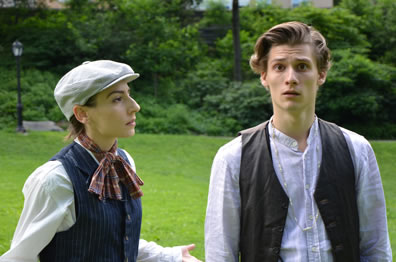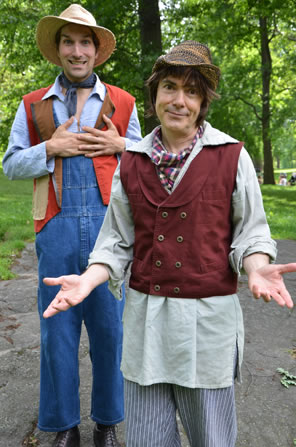As You Like It
Even in Panoramavision, It's about the Verse
New York Classical Theatre, Battery Park, New York, N.Y.
Saturday, July 12, 2014 (wherever we could alight, scene to scene)
Directed by Stephen Burdman
Clinton Castle has a storied history. It was built on the tip of Manhattan in 1811 as one of a network of forts protecting New York Harbor. Decommissioned in 1823, over the years it has served as a garden, restaurant, opera house, theater, trade center, immigrant landing depot (before that operation moved to Ellis Island), aquarium, ticket office for Statue of Liberty ferries, and the palace of a usurping duke.

Rosalind (Rin Allen) as Gannymede pretends to be Rosalind for Orlando (Ian Antal) in the New York Classical Theatre production of William Shakespeare's As You Like It in Central Park. The play subsequently moved to Battery Park. Photograph by Miranda Arden, New York Classical Theatre.
The last two are the fort's current use: National Park Service landmark and Statue of Liberty ticket office by day, setting for the palace scenes in New York Classical Theatre's "panoramic production" of William Shakespeare's As You Like It. In panoramic theater, the production moves from place to place with each scene, and the audience moves with it. We thus literally move inside a "castle" to see Orlando wrestle Charles for the Duke, we move to the plaza in front of the castle when Adam intercepts Orlando on his way home, and then we move to Arden—or at least the tree-covered lawns of Battery Park.
That in itself makes for interesting Shakespeare as well as an evening's physical workout. However, now in its 15th year, New York Classical Theatre relies as much on the actors as the landscape to make for memorable, magical theater. Artistic Director Stephen Burdman who directs this As You Like It has assembled a strong cast of a dozen actors to play a dozen roles, including 12-year-old Jackson Demott Hill (don't remember a boy in As You Like It? well, hang on). The production opened in May in Central Park (not to be confused with the Public Theater's annual Shakespeare in the Park productions at Delacorte Theater), moved to Brooklyn's Prospect Park, and is now finishing up its run in Battery Park, where Castle Clinton and the adjoining lawns prove a perfect setting.
The restrictions in such a production are less the landscape—in this case a people-busy city park where tour boats unload and a distracting thump-thump-thumping comes across the water from a party over on Governors Island (that's some sound system!)—and more the timing. Starting at 7 p.m., the show has a two-hour window of light this time of year, and for the final scenes, stagehands are shining flashlights on the actors. Logistics and timing, then, require much cutting of the text and judicial casting, and for As You Like It, Burdman has also radically revised the final scene to account for some of his choices.
The first question in any such exercise is how much does it contribute to the play? Answer: a lot. The costumes by production designer Amelia Dombrowski set the action in 1920s New York, with the courtiers in flapper dresses and three-piece business suits and the country folk in rustic overalls and colorful work dresses, though Corin in a red vest and long hair looks like Charlie Watts circa 1971. (The stagehands wear sheep backpacks: hmmm, the sheep are herding the humans—nice touch.) Rosalind (Rin Allen) and Celia (Connie Castanzo) play their first scene outside the entrance to Castle Clinton, and it looks like it might be a historic re-enactment of two women visiting the one-time New York Aquarium. Touchstone (John Robert Armstrong) fetches them and us to see the wrestling, the fort's gates open and in we enter to find Orlando (Ian Antal) and Charles (Daniel Patrick Smith), the latter wearing a black cowl mask, loosening up for their match as we form a circle around them. A couple of scenes later, we return outside for old Adam (Hill) intercepting Orlando from the deathtrap his brother Oliver (Sid Solomon) has set for him, and then we are all invited to head over to Arden.
The move to Arden is a festive parade, and it almost overwhelms the camera-toting tourists on The Battery. Meanwhile, the actors are filling in the hustling, bustling interlude with key dialogue. Touchstone's voice rises above the din: "What, carry you? You've gone no more than 10 yards!" Turns out he's talking to Celia, whom he then carries on his back the rest of the way. Over to the side, we see a man shouting for Phoebe. This is Silvius, and he's asking passersby (some of whom may not be part of our audience) if they've seen her. "She's my girlfriend, but she doesn't know that," he says to somebody. When we arrive on a lawn with several large trees, Rosalind, courtesy of Shakespeare's script, tells us, "Well, this is the Forest of Arden," and Touchstone's complaining about his legs being weary is already resonating with some of us. Later, we're herded to a plaza of trees, and each tree, even those behind us, has a poem attached. So Rosalind and Celia can talk about the poet's identity in privacy, Corin and Touchstone exit and we see off in the distance Audrey (Emily Verla) meeting them on the path and Corin introducing her to Touchstone.
These natural scene changes yet are only enhancements to Shakespeare's script and the players playing them. With the cast size pared down to 12 characters and a large geographic space making quick costume changes difficult, the onus rests on single performances to carry the weight of Shakespeare's plot. The "many merry men" banished with Duke Senior here number just two: Duke Senior (Christopher Cass) and Jaques (Clay Storseth). In a glow from the setting sun that only the most talented lighting designer could duplicate, Cass delivers Duke Senior's speech comparing the life of the forest with that of the court as a sort of welcome for us to his new world. Jaques soon appears, laughing about the motley fool he met in the forest, and we are suddenly in the scene in which Orlando arrives seeking food; and as Orlando then departs to fetch Adam, the banished Duke and Jaques move into "All the world's a stage." With no props, special effects (other than that setting sun), or other players to listen, these speeches rely solely on the actors' straight delivery of them for their effectiveness, and both Cass and Storseth have such mastery of the verse that we hang on their every word.
The whole cast displays such a quality. As Silvius gives his "what 'tis to love" speech, he textures it with such true depth of knowledgeable feeling that even the lightning bugs suspend their flights and listen all aglow, and the moment's comic construction, the round-the-circle responses of "and so am I for…" by the other characters, becomes a mere sideshow.
Antal's Orlando is so expressive he shares with us through his malleable face a mind wrestling with such formidable matter as a brother wasting him away and then plotting to kill him, a princess who dotes on him, a boy who offers to play the part of his true love (and, gee, he kind of looks like his true love, too), and his suddenly reformed brother just as suddenly marrying while Orlando still languishes in unrequited love.
Allen presents a Rosalind of much fortitude. She's a survivor, and that has given her an inner strength that in itself worries her uncle, the usurping Duke Frederick (Nick Salamone). When he first greets the two young women to the wrestling, Salamone's Duke says "How now, daughter—and cousin!" pausing before ginning up the nerve to even address her and then doing so with notable distaste in the word cousin. We can see this Rosalind already thinking her way through impending banishment before Celia comes up with the idea to run away in disguise to Arden. When Rosalind arrives in the forest and Corin calls her "gentle sir," she smiles in satisfaction that she is carrying off her disguise.

Corin (Nick Salamone, front) and Silvius (Daniel Patrick Smith) are not what they seem in New York Classical Theatre's As You Like It. Photo by Miranda Arden, New York Classical Theatre.
Rosalind is one of Shakespeare's marvelous creations, but she is not alone the play's central character. She shares that spotlight not only with Orlando but also with Celia. In Castanzo, this production continues a string of performances I've seen the past several years in which Celia is a consistent equal to her cousin. Castanzo and Allen share a strong acting chemistry from their first appearance, and in the moment of her cousin's banishment, this Celia's allegiance is made clear even before her father leaves the scene. "Pronounce that sentence then on me, my liege: I cannot live out of her company," she says. Though short but seeming tallest of all, Castanzo speaks this line as a stern verbal gauntlet thrown at her father's feet. "You are a fool," he replies, dismissing her determination as childish prating: not recognizing his daughter's maturity, he's the fool. That Celia is largely silent once the duo reaches Arden is not an indication of her state as a secondary character; rather, there is great importance in it. Shakespeare was not one to waste actors on stage, and the mere fact that Celia is almost always on stage with Rosalind despite saying little is a clue that Shakespeare continues seeing the two as a pair of equals. It is up to the actress and director to create that equality in Celia's behavior, and Castanzo keeps Celia ever in our conscious, whether she is peering from behind trees watching Rosalind's play-acting as Gannymede or openly commiserating with Silvius when Phoebe (Antoinette Robinson) berates him.
If you've been keeping up with the math, you've figured out that I've listed more than 12 characters—yet nobody is doubling parts. Touchstone incorporates La Beau's lines, and Adam incorporates Hymen's, but only William, Sir Oliver Martext, Oliver's servant, and Amiens and the rest of the banished lords are totally excised. If you've looked closely at your program, you'll also see that both Corin and Silvius are missing from the cast list. Peace, ho! I bar confusion: 'Tis I must make conclusion, as Hymen, er, old Adam says. But to do so requires a spoiler alert (and to read how the play ends, click here).
And if you've been paying close attention to the details in this account, you might have picked up on a piece of casting Burdman uses for thematic purposes: the 12-year-old Hill playing the fourscore Adam. Burdman is visually riffing on the Seven Ages of Man speech with this casting, the schoolboy already the pantaloon "turning again toward childish treble." That could have been an overreach if Hill were not so good with the verse and playing so well an old man relying on his cane to stay upright. It also amps up the humor when Oliver calls him "Old dog" and Orlando says of him "O good old man, how well in thee appears the constant service of the antique world." Hill also brings out the soft side of Orlando as I've never seen before; this is perhaps the product of Antal working not with an older veteran actor but with a kid a third his size. There's a playful yet tender interplay there that makes this bizarre casting work, thematic or not.
Besides, as with any good Shakespeare, it comes down to the text and playing his words. It's not just the trappings that enthrall us with New York Classical Theatre's panoramic As You Like It, it's the enthralling verse that entraps us.
Eric Minton
July 12, 2014
Comment: e-mail editorial@shakespeareances.com
Start a discussion in the Bardroom



 Find additional Shakespeareances
Find additional Shakespeareances